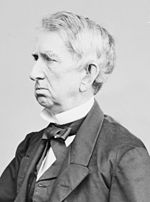No subscription or hidden extras
Read through the most famous quotes from William H. Seward
"
Early life and career
Seward was born in Florida New York on May 16 1801 one of five children of Samuel Sweezy Seward and his wife Mary Jennings Seward. The Auburn Doubledays baseball team gave away William Seward bobble-head dolls as a 2010 promotion. After Tsar Alexander II put down the 1863 January Uprising in Poland French Emperor Napoleon III asked the United States to "join in a protest to the Tsar.
" His contemporary Carl Schurz described Seward as "one of those spirits who sometimes will go ahead of public opinion instead of tamely following its footprints. On the night of Lincoln's assassination he survived an attempt on his own life. A determined opponent of the spread of slavery in the years leading up to the American Civil War he was a dominant figure in the Republican Party in its formative years and was widely regarded as the leading contender for the party's presidential nomination in 1860.

